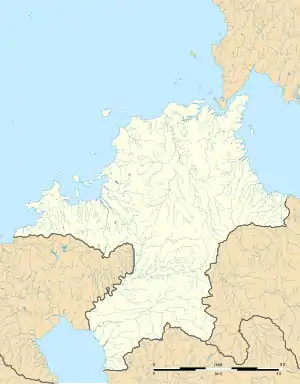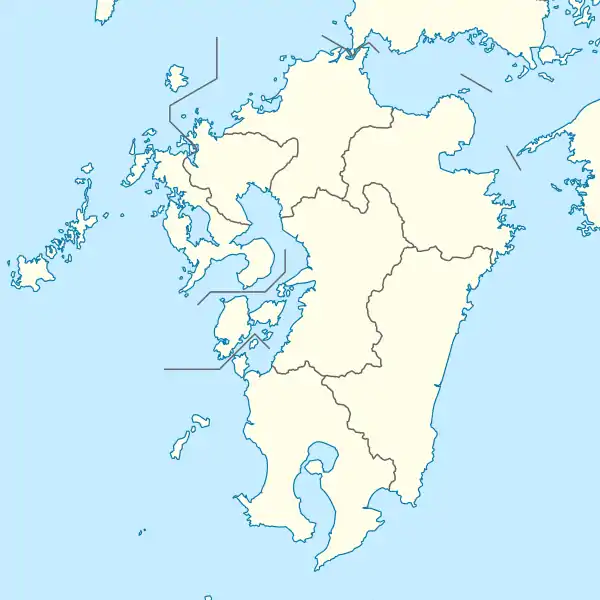Kashii Station
Kashii Station (香椎駅, Kashii-eki) is a train station on the Kagoshima Main Line located in Higashi-ku, Fukuoka, Fukuoka City, Fukuoka Prefecture, Japan. It is operated by JR Kyushu.[1]
JA 04 JD 06 Kashii Station 香椎駅 | ||||||||||||||||||||
|---|---|---|---|---|---|---|---|---|---|---|---|---|---|---|---|---|---|---|---|---|
 Kashii Station in 2010 | ||||||||||||||||||||
| General information | ||||||||||||||||||||
| Location | 11-1 Kashii-Ekimae 1-chōme, Higashi Ward, Fukuoka City, Fukuoka Prefecture Japan | |||||||||||||||||||
| Coordinates | 33°39′33″N 130°26′38″E | |||||||||||||||||||
| Operated by | ||||||||||||||||||||
| Line(s) | ||||||||||||||||||||
| Distance | ||||||||||||||||||||
| Platforms | 1 side + 2 island platforms | |||||||||||||||||||
| Tracks | 5 + 2 passing loops and numerous sidings | |||||||||||||||||||
| Construction | ||||||||||||||||||||
| Structure type | At grade | |||||||||||||||||||
| Other information | ||||||||||||||||||||
| Station code |
| |||||||||||||||||||
| Website | Official website | |||||||||||||||||||
| History | ||||||||||||||||||||
| Opened | 28 September 1890 | |||||||||||||||||||
| Passengers | ||||||||||||||||||||
| FY2021 | 11,321 daily | |||||||||||||||||||
| Rank | 10th (among JR Kyushu stations) | |||||||||||||||||||
| Services | ||||||||||||||||||||
| ||||||||||||||||||||
| Location | ||||||||||||||||||||
 Kashii Station Location within Fukuoka Prefecture  Kashii Station Kashii Station (Kyushu)  Kashii Station Kashii Station (Japan) | ||||||||||||||||||||
Lines
The station is served by the Kagoshima Main Line and is located 69.8 km from the starting point of the line at Mojikō.[2]
The station is also served by the Kashii Line and is located 12.9 km from the starting point of the line at Saitozaki.[3]
Layout
The station consists of a side and two island platforms serving five tracks.[2]
Platforms
| 1 | ■ Limited Express Sonic, Nichirin | for Kokura, Yanagigaura, Ōita, Saiki, and Miyazaki |
| ■ Kagoshima Main Line | for Orio, Kokura, and Mojikō | |
| ■ Kashii Line | for Umi-no-Nakamichi and Saitozaki | |
| 2 | ■ Limited Express Sonic, Nichirin, Kirameki | for Hakata |
| ■ Kagoshima Main Line | for Hakata, Futsukaichi, Tosu, Kurume, and Ōmuta | |
| 3 | ■ Kagoshima Main Line | for Hakata, Futsukaichi, Tosu, Kurume and Ōmuta |
| ■ Kashii Line | for Umi-no-Nakamichi, Saitozaki, Chōjabaru and Umi | |
| 4 | ■ Kashii Line | for Umi-no-Nakamichi, Saitozaki, Chōjabaru, and Umi |
| 5 | ■ Kashii Line | for Umi-no-Nakamichi, Saitozaki, Chōjabaru, and Umi|} |
History
The privately run Kyushu Railway had begun laying down its network on Kyushu in 1889 and by 1890 had a stretch of track from Hakata southwards to Kurume. The track was extended northwards from Hakata to Akama by 28 September 1890, with Kashii being opened on the same day as one of the intermediate stations. On 1 January 1904, the Hakata Bay Railway opened a line between Saitozaki and Sue, connecting to Kashii as one of the intermediate stops. The Kyushu Railway was nationalized on 1 July 1907, Japanese Government Railways (JGR) took over control of the station. On 12 October 1909, the station became part of the Hitoyoshi Main Line and then on 21 November 1909, part of the Kagoshima Main Line. In 1942, the Hakata Railway, now renamed the Hakata Railway and Steamship Company merged with other companies, becoming the Nishi Nippon Railroad (Nishitetsu). On 1 May 1944, Nishitetsu's line from Saitozaki to Sue and its later extensions to Shinbaru and Umi were also nationalized and became designated as the Kashii Line. With the privatization of Japanese National Railways (JNR), the successor of JGR, on 1 April 1987, JR Kyushu took over control of the station.[4][5]
Passenger statistics
In fiscal 2016, the station was used by 12,172 passengers daily, and it ranked 10th among the busiest stations of JR Kyushu.[6]
See also
References
- "JR Kyushu Route Map" (PDF). JR Kyushu. Retrieved 23 February 2018.
- Kawashima, Ryōzō (2013). 図説: 日本の鉄道 四国・九州ライン 全線・全駅・全配線・第3巻 北九州 筑豊 エリア [Japan Railways Illustrated. Shikoku and Kyushu. All lines, all stations, all track layouts. Volume 3 Kyushu Chikuhō area] (in Japanese). Kodansha. pp. 27, 69. ISBN 9784062951623.
- Kawashima, Ryōzō (2013). 図説: 日本の鉄道 四国・九州ライン 全線・全駅・全配線・第3巻 北九州 筑豊 エリア [Japan Railways Illustrated. Shikoku and Kyushu. All lines, all stations, all track layouts. Volume 3 Kyushu Chikuhō area] (in Japanese). Kodansha. p. 70. ISBN 9784062951623.
- Ishino, Tetsu; et al., eds. (1998). 停車場変遷大事典 国鉄・JR編 [Station Transition Directory – JNR/JR] (in Japanese). Vol. I. Tokyo: JTB Corporation. pp. 218, 220. ISBN 4-533-02980-9.
- Ishino, Tetsu; et al., eds. (1998). 停車場変遷大事典 国鉄・JR編 [Station Transition Directory – JNR/JR] (in Japanese). Vol. II. Tokyo: JTB Corporation. pp. 678, 695. ISBN 4-533-02980-9.
- "駅別乗車人員上位300駅(平成28年度)" [Passengers embarking by station - Top 300 stations (Heisei 28)] (PDF). JR Kyushu. 31 July 2017. Archived from the original (PDF) on 1 August 2017. Retrieved 25 February 2018.